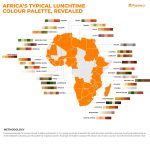They came from their houses under the light morning rain on Saturday, July 10, this year. Fifteen in all, 5-11-year-olds, the children gathered around a heap of plastic wastes in a storeroom inside a three-bedroom apartment at No. 1 Edim Ebage Street in Big Qua, a community in Calabar, southern Nigeria’s Cross River State.
They had come to continue their usual weekend activity of repurposing plastic waste for creative reuse using simple cutting and binding tools and materials like scissors, staplers, pins and thick gum.
By noon, they had made a straw mat from plastic straws, several pen holders from old newspapers, a chandelier from disposed plastic cups, and other products from plastics. The storehouse that serves as their workplace belongs to 38-year-old Isaiah Etteh, their coach.
Thrice weekly, after school, the children go to local restaurants, bars, waste bins, and streets to gather littered plastics and papers. They take the waste to the storeroom in Etteh’s house and spend their weekends transforming them into beautiful works of art and products.
“I enjoy everything about upcycling; from when we have to gather the wastes to when we have to wash and disinfect them, think of what to make out of them, and finally work together to create something beautiful,” said 11-year old Shedrach Theophilus.
To make a chandelier from disposed plastic cups, for example, they wash, disinfect, sun-dry the cups, and then use gum and staplers with pins to bind them into layers that form a circumference – finishing the top by carefully laying as many cups as possible to make a perfect covering.
They then stick the chandelier to the ceiling using thumbtacks after connecting an electric bulb to the inner part of the enclosed chandelier. The varied colours of the cups allow for a reflection of beautiful light shades.
And to produce a straw mat, after washing, disinfecting and sun-drying the straws, they use threads to firmly join each straw with another until they achieve the desired length. Afterwards, they use artistic paints to draw beautiful designs on the body of the finished mat.
This process of transforming plastic waste for creative reuse without any costly industrial or factory process is called upcycling. It is unlike recycling that requires heavy and expensive machines to break down and melt waste materials to produce something entirely new.
The children use the finished products at their homes and also sell some. For example, they sell a straw mat at N1000 ($2.4), a chandelier at N3,000 ($7.3), and a pen holder at N500 ($1.2).
“With the money we make from selling the items, we buy socks, books, food, and more materials to use [for production],” said 10-year-old Donald Efefiom, a pupil at Presbyterian Primary School in Calabar.
The kids call themselves Young Eco Heroes, and they belong to the Eco Heroes Club of Deeproot Academy, a nonprofit dedicated to teaching children in Cross River about the dangers of environmental pollution in line with the United Nations sustainable development goals (SDGs) 12 (responsible consumption and production), 13 (climate action), 14 (life below water), and 15 (life on land).
Etteh, an SDGs advocate and the organization’s creative director and founder, created the club in December 2018. He trains the kids to take action against plastic pollution through upcycling.
He said he focuses on plastic reuse because he believes that one way of fighting plastic pollution is to subject plastics to extended use.
Across the world, at least 300 million metric tonnes of plastic are produced every year, and only 9% of plastics ever produced has been recycled. With half of all plastics designed for single-use, it means nearly 80% of all plastics end up in dumps, landfills and natural environments like seas and oceans through rivers.
Over time, most plastics in the ocean are broken down into tiny pieces by sunlight, wind and waves. The small bits are sometimes eaten by water animals that mistake them for food. These microplastics can kill marine life by blocking their digestive system. Some fishes and aquatic life that eat the microplastics but survive death could end up in human plates as meals.
Researchers are guessing that eating plastic-polluted seafood could affect human health since the chemicals used in producing plastics are capable of causing hormone disorders, cancers, birth defects, and interference in brain development in unborn children.
Nigeria, which released 200,000 metric tonnes of plastics into the ocean in 2018 alone, is estimated to have its yearly plastic production rate grow to 530,000 metric tonnes by 2022, up from 120,000 metric tonnes in 2007. With rising production rate, low waste management capacity, and slim investment in recycling, it means the country’s plastic release into natural environments could exponentially surge with heavy health and environmental consequences.
Nigeria joined the Global Plastic Action Partnership of the World Economic Forum last January. But the country is yet to launch its National Plastic Action Partnership, which the global forum requires Nigeria to do as part of efforts to reduce plastic pollution.
The Young Eco Heroes believe that their upcycling activities are their contributions to efforts towards reducing plastic pollution in Cross River and Nigeria.
Initially, Etteh wanted to get into recycling but was limited by the lack of funds to acquire machines for the process.
“With recycling, you need machines to melt the plastics and mould them into shape before they can be transformed into new products, and we can’t afford such machines,” he said.
But in early 2018, when Etteh heard about upcycling at a training he attended, he felt he had found an alternative to recycling. He started reading articles, watching Youtube videos, and practising to master the process of upcycling. And once he gained the mastery, he gathered children and started teaching them.
Etteh said his decision to work with children stems from his belief that children are seldom involved in environmental activism in Nigeria. He also believes that when properly educated and guided at an early age, they can be more passionate about protecting and saving the environment than adults.
Etteh regularly leads the children to visit primary and secondary schools in Calabar to recruit new kids. In 2021 alone, they have visited 20 schools and formed eight new clubs in eight schools. He has trained about 1000 children and teenagers in Cross River since 2018.
“I see waste as something that can give me money, and I value it. Each time I see people disposing of tyres, rubbers, and papers, I feel bad because they don’t know the usefulness of what they’re throwing away,” said 17-year-old Delight Osim, who was trained in 2019 and afterwards founded her own group of nine kids who now upcycle plastics to produce and sell chairs, tables, and chandeliers.
For some kids, the support they get from their relatives and teachers keeps them motivated.
“My grandmother once told me ‘mkpo ke mbio (there is value in waste),’ said Efefiom in Efik, a language spoken by the Efik tribe of Cross River.
Yet, not everyone appreciates their work. “Sometimes, when I’m picking littered plastics, people look at me and think I’m mad,” said Theophilus. “Not everyone understands the importance of upcycling. We want people to applaud us and cheer us on, but that doesn’t happen a lot.”
Eleven-year-old David Etim adds, “Most times, we might just be talking to our friends, and they will walk away or laugh at us.”
One challenge the kids face is that upcycled materials wear out more quickly than recycled ones, making it hard for them to convince buyers to pay more for them. For example, within months of regular use, due to frequent reflection from the electric bulb, the original colours of cup-made chandeliers change to dull and less appealing ones.
Etteh said the club still desires to get into recycling, but the money the kids make from selling upcycled plastics is far from what they need to buy recycling machines.
“We do not have the money to make as many products as we would love to, and we sometimes run out of materials to work with,” he said.
But until whenever they are able to recycle and increase their production capacity, “we will continue to make people understand that waste is not waste until it is completely wasted,” Theophilus said.
In Calabar, Nigeria, a group of children aged 5-11, known as the Young Eco Heroes, gather on weekends to repurpose plastic waste into creative items such as chandeliers from disposable cups and straw mats from plastic straws. They collect these materials from local restaurants, bars, and streets, bring them to their coach Isaiah Etteh's house, and use simple tools to upcycle the waste. This initiative is part of the Deeproot Academy's Eco Heroes Club, founded by Etteh, with the aim of educating children on environmental pollution and promoting sustainable development goals.
The children enjoy the upcycling process and sell their creations to buy necessary supplies, reinforcing their commitment to reducing plastic pollution in their region. Despite facing societal misunderstandings and technical challenges, such as the durability of their products, the young activists continue to advocate for the usefulness of waste, inspired by Etteh's training and leadership.
Nigeria faces significant plastic pollution, with low recycling rates and rising production, which poses severe environmental and health risks. The Young Eco Heroes' efforts contribute modestly to addressing this issue, showcasing the potential impact of community-driven solutions and the importance of involving the younger generation in environmental activism.






